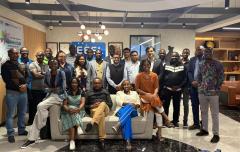"Why Wait" report quantifies benefits of accelerating electricity access
Nov. 17, BONN, Germany – When you’re visiting a remote village in Africa that’s using solar power instead of kerosene as its only source of energy, it’s easy to see the positive impacts. Financial savings, more time for studying and reduced air pollution are just a few of the obvious dividends from using a pico solar lamp, a home solar system or more robust power from a solar mini grid system.
Now, with yesterday’s release of the Why Wait? Seizing the Energy Access Dividend report from Sustainable Energy for All (SEforALL) in partnership with Power for All and the Overseas Development Institute, these benefits can be measured and quantified.
The report, launched at the UN Climate Conference (COP23), makes a powerful case for countries to accelerate efforts to provide decentralized renewable energy services, especially in remote rural areas that will be waiting for many years, if not decades, for centralized electric-grid service to reach them. More than 1 billion people are still living without any access to electricity, most of them in Sub-Saharan Africa and South Asia.
Speaking at an SEforALL hosted side-event at the COP, Rachel Kyte, Special Representative to the UN Secretary-General and CEO of Sustainable Energy for All, said: “For many decision-makers, the default is building grids. It’s pernicious, and it’s expensive. It’s positively possible to bring (renewable energy) solutions to these communities more quickly.”
“It’s a fraction of the time. It takes weeks, if not days,” added Kristina Skierka, CEO of Power for All, referring to how quickly solar services can be provided. “And it will have an exponential effect on jobs and revenues.”
The first-of-its-kind report uses Bangladesh, Ethiopia and Kenya as examples of the dividends that countries can expect by providing quicker access to basic electricity – primarily Tiers 1 and 2 – compared to electric grid-focused electrification strategies. Conventional electrification strategies in countries across Africa and Asia are far behind schedule in achieving Sustainable Development Goal 7, which calls for universal access to electricity for all by 2030.
Among the report’s key findings:
Financial savings: By using solar for lighting and mobile phone charging instead of burning kerosene and paying external phone charging costs, “some households can save up to $10 a month,” said Andrew Scott, the report’s lead author who works at the Overseas Development Institute. “Add that up over a year and you’re seeing substantial savings being freed up for other uses.”
Educational benefits: By having more light for studying, Scott said, some households will see 20 to 30 more minutes of extra study time every day per student. “Aggregate that over a year and you’ll end up with a significant amount of school time being lost (by delaying electricity access),” Scott said.
Climate benefits: The data also shows significant climate-related pollution reductions from less kerosene use - as much as 330 million tons cumulatively in Ethiopia, which is roughly the same as the annual emissions from 60 million passenger vehicles.
The collective benefits for countries are also impressive; the estimated extra time for studying, for example, is equivalent to the time sent in school each year of between 142,000 and 2 million students, depending on the country and the time frame to deliver universal energy access.
Kyte’s response to all this was clear: “Why wait if you can advance these solutions?”
The report, supported by Wallace Global Fund, was launched on the same day that 20 countries announced a new coalition committed to phasing out coal from their future power generation, with an aim of having more than 50 countries in the coalition by COP24 in 2018.
“Adding more coal to our centralized grids is not a solution,” Kyte said. “We haven’t reached (these populations) for the last 150 years this way. We’re not going to do it now.”
Read the Why Wait? Seizing the Energy Access Dividend report in full here, and follow #SDG7Dividend for more.



